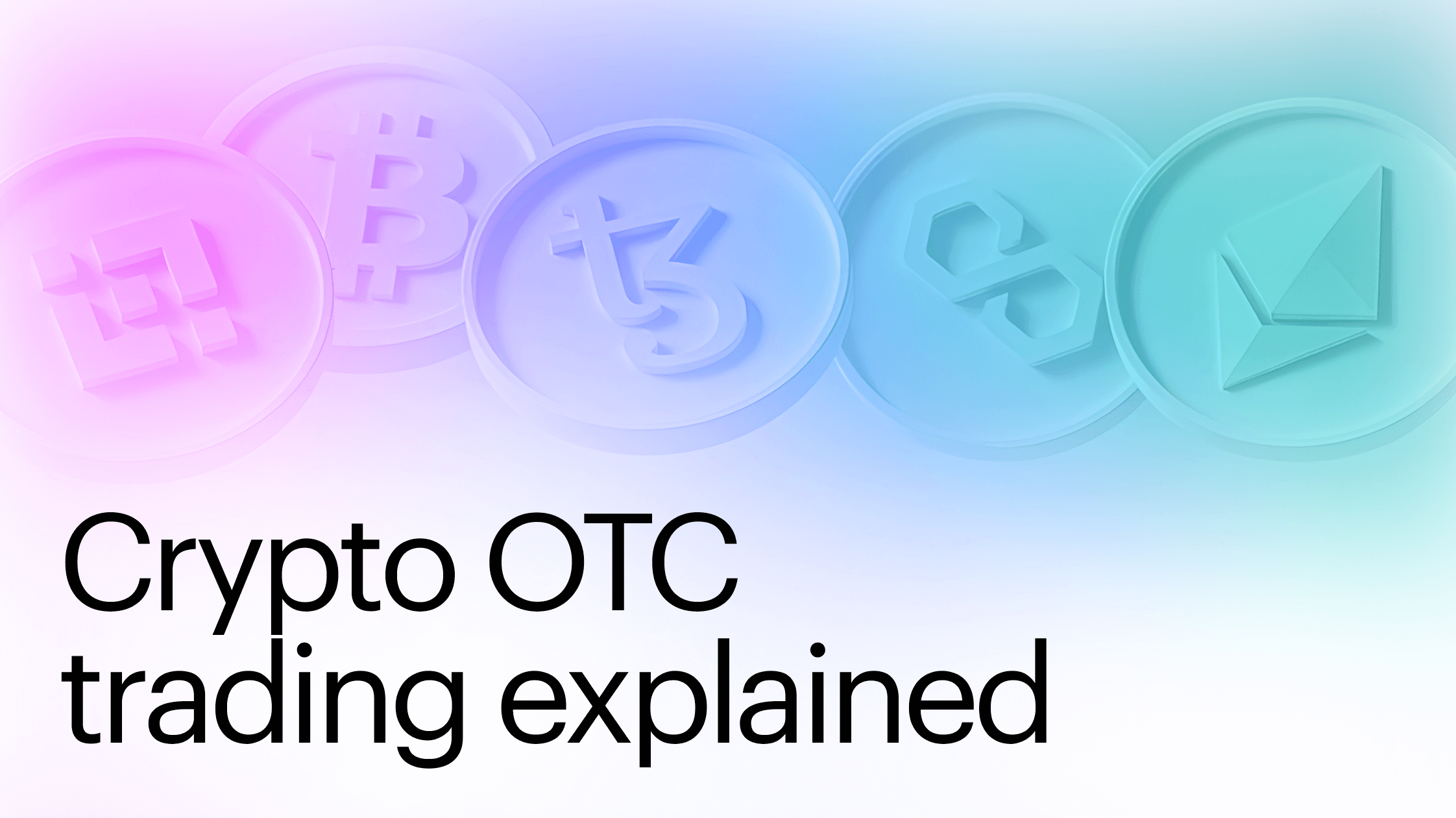As cryptocurrency markets and networks mature, traders and institutions are seeking efficient, discreet and reliable mediums to execute large handed transactions. This is where OTC crypto trading comes into role. Unlike how traditional exchanges function, where trades happen on public order books, OTC crypto trading (Over the counter crypto trading) allows buyers and sellers to transact directly offering better privacy, security, price stability and access to deeper liquidity. Through this article, we will explore what OTC crypto trading stands for and how it works, when to use it and how it is making a difference for institutions, high net worth individuals and crypto businesses.
Understanding OTC crypto trading
OTC (Over-the-counter) crypto trading refers to buying and selling digital assets outside of public exchanges. This means, instead of matching orders in an open market, trades are facilitated by crypto OTC desks or liquidity providers who directly connect buyers and sellers. Key features of OTC trading include;
- Private transactions which don’t appear on exchange order books.
- Custom settlement terms to fit large volume traders.
- Deeper liquidity access than what most exchanges can provide.
Ultimately, OTC desks act as intermediaries to ensure smooth execution of large volume trades without causing unfavorable price movements (termed slippage).
Difference between OTC and Exchange trading
OTC Crypto trading
- It provides access to high liquidity for large trades through liquidity providers and desk deployments.
- It offers high privacy since trades are not visible on public order books.
- It provides minimal slippage risk which is possible even for very large volume transactions.
- The execution is flexible and negotiated and not instant.
- It is primarily used by institutions, crypto whales and high net worth individuals.
Exchange trading
- In exchange trading, liquidity is usually sufficient for retail and small trades but large trades generally face hurdles.
- It runs on lower privacy as trades are executed publicly and are visible on public records.
- There is higher risk of slippage attached when placing large buy or sell orders
- Execution is immediate depending on order book depth.
- It is best suited for retail traders and small scale transactions.
The Working of OTC Crypto Trading
The process of OTC bitcoin trading or digital assets generally follow the stated steps;
- Request a Quote (RFQ) - A trader approaches a crypto OTC desk with the desired trade size and asset.
- Negotiation - The desk then provides a pricing based on market conditions and liquidity.
- Execution - once the terms are agreed upon, the trade is executed off-public records.
- Settlement - Assets are transferred securely through custodian wallets or institutional grade settlement platforms.
This model makes it particularly attractive for institutional crypto trading where precision, compliance and discretion are crucial at every step.
When to use OTC crypto trading
OTC trading is ideal for a certain kind of scenarios;
- For executing large trades - for trades which are above $100,000, avoiding slippage is very important.
- Institutional participation - hedge funds, family offices and corporations often prefer OTC for reasons like operational convenience and compliance.
- Crypto Whales - Useful for high net worth individuals who want to move significant amounts without disrupting market flows.
- Private crypto transactions - important for businesses that require confidentiality in treasury operations or cross border settlements.
- Low liquidity tokens - Certain assets may not have enough depth on exchanges but they can be sourced via OTC desks making them an easier resort.
Benefits of OTC desks for crypto
Using a crypto OTC desk provides multiple advantages which include;
- Price stability - The stability prevents large trades from disrupting the market flows.
- Anonymity - Transactions remain private and off-exchange or public records.
- Customized services - It provides personalized trade execution with flexible settlement.
- Access to liquidity providers - OTC desks bring together liquidity across multiple sources.
- Institutional-grade support - Compliance, custody and reporting are often a part of OTC desks.
For institutions, OTC is more than a convenience, it is an essential part of the evolving crypto financial infrastructure.
Risks and Important Considerations
While OTC crypto trading for institutions is very beneficial, it comes with a set of implications and things to keep in mind before deploying;
- Counterparty risk - relying on reputable and well regulated OTC desks is important.
- Regulatory compliance - One needs to keep a check on different jurisdictions requirements of KYC/AML.
- Settlement delays - Unlike instant exchange trades, OTC settlements come with longer settlement times depending on trade complexity
Also read: Japan’s Cashless Push: Credit Cards, PayPay, and CBDC Trials
Conclusion
As digital assets continue to scale and gain traction, crypto liquidity providers and OTC desks stay at the crux for ind=sturutional adoption and deployment. From crypto whales to seeking crypto treasury solutions, OTC ensures large scale trade executions efficiently, privately also reducing market disruptions at every stage. For enterprises and funds exploring when to use OTC crypto trading, you’ll find your answers in required trading volume, discretion and execution efficiency. Still not sure? Talk to our experts at TransFi and access institutional grade OTC trading solutions. Whether you’re looking for secure, compliant and efficient ways to trade crypto OTC or you’re just getting started from scratch, seek the right guidance and solutions with TransFi!
Frequently asked questions (FAQs)
- What is OTC crypto trading?
OTC (Over-the-counter) crypto trading refers to buying and selling digital assets outside of public exchanges. This means, instead of matching orders in an open market, trades are facilitated by crypto OTC desks or liquidity providers who directly connect buyers and sellers.
- What are the benefits of OTC desks for crypto?
- Price stability
- Anonymity
- Customized services
- Access to liquidity providers
- Institutional-grade support
- When should one use OTC crypto trading?
- For executing large trades
- Institutional participation
- Crypto Whales
- Private crypto transactions
- Low liquidity tokens
- What are the features of OTC trading?
- Private transactions which don’t appear on exchange order books.
- Custom settlement terms to fit large volume traders.
- Deeper liquidity access than what most exchanges can provide.
- Is OTC crypto trading safe?
Yes, if conducted with regulated, reputable OTC desks with strong custody solutions, crypto trading is safe and advised for large volume trades and other use cases.
Table of Contents
Suggested Article
Explore our products

Make global payments at the speed of a click

Accept payments, remove borders.

Unlock Seamless Digital Currency Transactions Anywhere
























